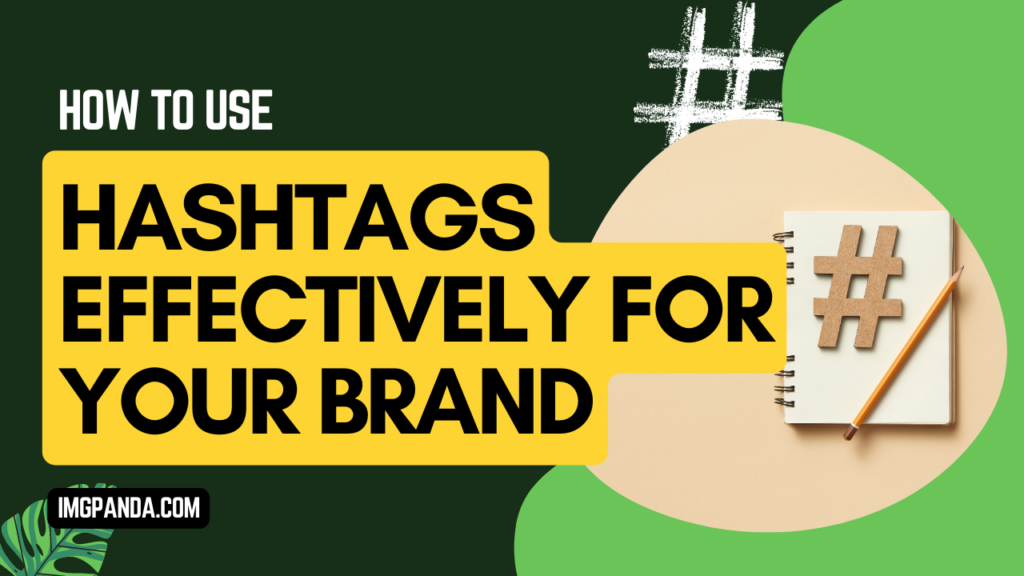Introduction
Hashtags have become an integral part of social media marketing, allowing businesses to increase their visibility, reach new audiences, and promote their brand. However, using hashtags effectively is not as simple as just slapping a few random ones onto a post. To truly harness the power of hashtags, it is important to use them strategically and purposefully.
In this blog post, we will discuss how to use hashtags effectively for your brand, including how to choose the right hashtags, best practices for using them on social media, hashtag campaigns, and common mistakes to avoid. By the end of this post, you will have a better understanding of how to leverage hashtags to drive engagement and promote your brand on social media.
Also Read This: The Benefits of Using Stock Footage in Your Video Production
How to choose the right hashtags for your brand
Choosing the right hashtags for your brand is essential to maximize your social media reach and engagement. Here are some tips to help you choose the best hashtags:
[caption id="attachment_182426" align="alignnone" width="2000"] How to choose the right hashtags for your brand[/caption]
How to choose the right hashtags for your brand[/caption]
Identify your target audience:
Start by understanding who your target audience is and what hashtags they are likely to use. This can help you create more relevant and effective hashtags for your brand.
Conduct research on popular and relevant hashtags in your industry:
Use tools like Hashtagify, RiteTag, or Socialert to research the most popular and relevant hashtags in your industry. This can give you insight into what hashtags your audience is already engaging with and using.
Avoid generic or irrelevant hashtags:
Avoid using generic or irrelevant hashtags that don't relate to your brand or content. These types of hashtags will not attract your target audience, and can even harm your brand by appearing spammy.
Use branded hashtags:
Branded hashtags are a great way to promote your brand and create a sense of community among your followers. Use your brand name or slogan in a hashtag to help users find and engage with your content.
By following these tips, you can choose hashtags that are relevant, engaging, and effective for your brand.
Also Read This: Understanding Flaticon Pricing Plans
Best practices for using hashtags on social media
Once you have chosen the right hashtags for your brand, it's important to use them effectively on social media. Here are some best practices for using hashtags:
[caption id="attachment_182427" align="alignnone" width="2560"] Best practices for using hashtags on social media[/caption]
Best practices for using hashtags on social media[/caption]
Limit the number of hashtags:
While it can be tempting to use as many hashtags as possible, it's important to keep in mind that less is often more. Studies have shown that using too many hashtags can actually decrease engagement. Aim for 2-5 hashtags per post.
Place hashtags strategically within posts:
Place hashtags strategically within your post to make it easy for users to find and engage with your content. For example, you can include hashtags at the end of your post, or within the post itself.
Tailor hashtags for specific platforms:
Different social media platforms have different rules and best practices for using hashtags. For example, Instagram allows up to 30 hashtags per post, while Twitter limits you to just a few. Make sure to tailor your hashtags to the specific platform you're using.
Track and analyze hashtag performance:
Use social media analytics tools to track and analyze the performance of your hashtags. This can give you insights into which hashtags are driving the most engagement, and help you optimize your hashtag strategy over time.
By following these best practices, you can use hashtags effectively to increase engagement and promote your brand on social media.
Also Read This: Creative Edit: Imgflip’s Canvas Unleashed
Hashtag campaigns for brand promotion
Hashtag campaigns are a great way to promote your brand and encourage user engagement. Here are some tips for planning and executing a successful hashtag campaign:
[caption id="attachment_182429" align="alignnone" width="2500"] How to Use Hashtags Effectively for Your Brand[/caption]
How to Use Hashtags Effectively for Your Brand[/caption]
Set clear goals and objectives:
Define what you want to achieve with your hashtag campaign, whether it's to increase brand awareness, drive engagement, or something else.
Choose a unique and memorable hashtag:
Choose a hashtag that is easy to remember and unique to your brand. Avoid generic or overused hashtags that won't stand out.
Promote your hashtag across all channels:
Promote your hashtag across all of your social media channels, email marketing, and any other marketing materials. Encourage your followers to use the hashtag and engage with your brand.
Offer incentives for participation:
Offer incentives for users to participate in your hashtag campaign, such as discounts, prizes, or shoutouts. This can help to encourage engagement and increase the visibility of your hashtag.
Track and analyze hashtag performance:
Use social media analytics tools to track and analyze the performance of your hashtag campaign. This can give you insights into how well the campaign is performing, and help you optimize it over time.
Some examples of successful hashtag campaigns include Coca-Cola's #ShareACoke campaign, which encouraged users to share photos of Coke bottles with their name on it, and the ALS Association's #IceBucketChallenge, which went viral and raised millions of dollars for charity.
By planning and executing a successful hashtag campaign, you can increase brand awareness, drive engagement, and promote your brand on social media.
Also Read This: Choosing the Right eStockPhoto for PowerPoint
Hashtag mistakes to avoid
While hashtags can be a powerful tool for promoting your brand on social media, there are some common mistakes to avoid. Here are some hashtag mistakes to watch out for:
[caption id="attachment_182430" align="alignnone" width="2500"] Hashtag mistakes to avoid[/caption]
Hashtag mistakes to avoid[/caption]
Using irrelevant or offensive hashtags:
Avoid using hashtags that are irrelevant or offensive to your brand. This can turn off potential customers and harm your brand's reputation.
Using too many hashtags:
As mentioned earlier, using too many hashtags can actually decrease engagement. Stick to 2-5 relevant hashtags per post.
Using overly generic hashtags:
Overly generic hashtags, such as #love or #fun, are used by millions of people and won't help your brand stand out. Instead, focus on more specific and relevant hashtags for your industry.
Not researching hashtags:
Not researching hashtags can lead to using irrelevant or overused hashtags. Make sure to research relevant and trending hashtags in your industry.
Not testing hashtags:
Testing hashtags can help you determine which ones are driving the most engagement and which ones to avoid. Make sure to test and analyze your hashtag strategy regularly.
By avoiding these common hashtag mistakes, you can improve the effectiveness of your social media marketing and promote your brand more effectively on social media.
Also Read This: 10 Reasons to Choose eStockPhoto for Business Photos
Pros And Cons:
| Pros | Cons |
|---|---|
| Increases brand awareness | Can be overused and lose effectiveness |
| Drives user engagement | Can lead to using irrelevant or offensive hashtags |
| Helps to organize and categorize content | Can decrease engagement if too many hashtags are used |
| Can help to promote brand values and messaging | Can be difficult to track and analyze performance |
| Provides insights into customer preferences and behavior | May not be effective for all industries or brands |
"Hashtags are a powerful tool for promoting your brand on social media, but it's important to use them strategically and avoid common mistakes."
Also Read This: Giving Attribution on 123RF: A Guide
Conclusion
In conclusion, hashtags can be a valuable tool for promoting your brand on social media, but it's important to use them strategically and avoid common mistakes. By choosing the right hashtags, following best practices for using them, and planning successful hashtag campaigns, you can increase brand awareness, drive user engagement, and promote your brand's values and messaging.
By avoiding common hashtag mistakes, such as using irrelevant or overused hashtags, you can improve the effectiveness of your social media marketing and maximize the impact of your brand on social media.
FAQs
How many hashtags should I use on each post?
It's recommended to use 2-5 relevant hashtags per post. Using too many hashtags can decrease engagement and come across as spammy.
How do I choose the right hashtags for my brand?
A: Research relevant and trending hashtags in your industry, and choose hashtags that are specific and relevant to your brand and content.
How do I track the performance of my hashtags?
A: You can use social media analytics tools to track the performance of your hashtags and analyze engagement, reach, and other metrics.
Can using hashtags be harmful to my brand?
A: Yes, using irrelevant or offensive hashtags can harm your brand's reputation and turn off potential customers. It's important to research and use relevant hashtags that align with your brand values.
Are hashtags effective for all industries and brands?
A: Hashtags may not be effective for all industries or brands. It's important to research and test different hashtag strategies to determine what works best for your brand and audience.
